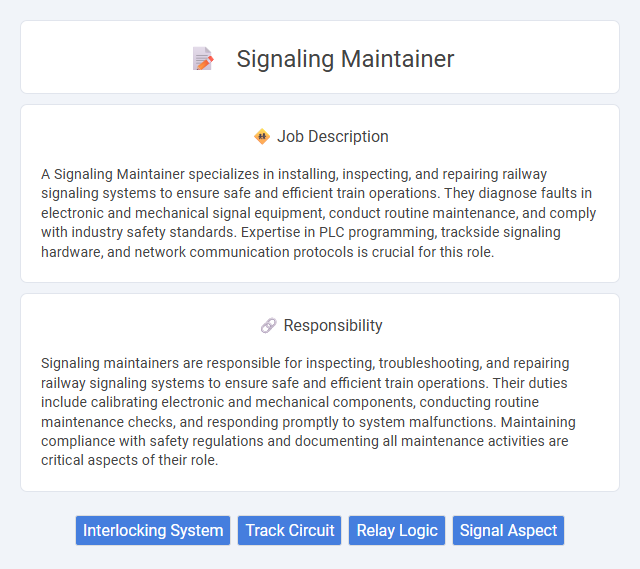
A Signaling Maintainer specializes in installing, inspecting, and repairing railway signaling systems to ensure safe and efficient train operations. They diagnose faults in electronic and mechanical signal equipment, conduct routine maintenance, and comply with industry safety standards. Expertise in PLC programming, trackside signaling hardware, and network communication protocols is crucial for this role.
Individuals with strong attention to detail and the ability to remain calm under pressure are likely to be suitable for a signaling maintainer job. Those who thrive in structured environments and possess technical aptitude may find this role aligns well with their skills. People who struggle with irregular hours or high-stress situations might face challenges adapting to the demands of this position.
Qualification
A Signaling maintainer must possess in-depth knowledge of telecommunications signaling protocols such as SS7, SIP, and ISDN, along with practical experience in configuring and troubleshooting signaling systems. Proficiency in diagnostic tools, signal analyzers, and network monitoring software is essential to ensure seamless communication network performance. Strong analytical skills, a background in electrical or telecommunications engineering, and certifications like CCNA or equivalent are highly valued qualifications for this role.
Responsibility
Signaling maintainers are responsible for inspecting, troubleshooting, and repairing railway signaling systems to ensure safe and efficient train operations. Their duties include calibrating electronic and mechanical components, conducting routine maintenance checks, and responding promptly to system malfunctions. Maintaining compliance with safety regulations and documenting all maintenance activities are critical aspects of their role.
Benefit
A signaling maintainer job likely offers strong job stability due to the critical role of maintaining railway signaling systems. The position may provide competitive salaries and benefits, reflecting the specialized skills required. Opportunities for career advancement and continuous technical training are probably available, enhancing long-term professional development.
Challenge
The signaling maintainer job likely involves complex troubleshooting and ensuring the reliability of railway communication systems under demanding conditions. Challenges may arise from the need to quickly diagnose faults and implement solutions to prevent service disruptions. It is probable that maintaining safety standards while working with sophisticated signaling technology requires continuous skill updates and precision.
Career Advancement
Signaling maintainer roles offer critical expertise in telecommunications infrastructure, specializing in the maintenance and troubleshooting of signaling systems such as SS7 and SIP protocols. Career advancement in this field typically progresses through mastering complex network architectures, acquiring certifications like CCNA or LTE, and transitioning into senior technical positions or network architecture roles. Strong problem-solving skills and continuous learning are essential for climbing the career ladder in signaling maintenance, enabling professionals to lead projects and influence network design decisions.
Key Terms
Interlocking System
Signaling maintainers specializing in Interlocking Systems are responsible for ensuring the safe and efficient operation of railway signaling equipment that controls track switches and signals. They perform routine inspections, troubleshoot, and repair both mechanical and electronic components to prevent system failures and enhance operational safety. Expertise in relay interlocking, electronic interlocking, and computer-based interlocking systems is essential to maintain compliance with railway safety standards.
Track Circuit
Track Circuit signaling maintenance involves inspecting, testing, and repairing electrical circuits that detect train presence on railway tracks, ensuring safe train movement and preventing collisions. Technicians diagnose faults using advanced measurement tools and replace components like relay coils, batteries, and track bonds to maintain signal integrity. Routine maintenance and timely troubleshooting of track circuits are critical to sustaining uninterrupted rail operations and enhancing railway safety standards.
Relay Logic
Signaling maintainers specializing in Relay Logic ensure the efficient operation and troubleshooting of relay-based signaling systems critical to railway safety and communication. Their expertise includes inspecting, testing, and repairing electromechanical relays, circuits, and associated control panels to prevent failures and maintain signal integrity. Mastery of relay logic diagrams and adherence to safety protocols are essential for minimizing downtime and ensuring uninterrupted train movement.
Signal Aspect
A signaling maintainer specializes in the inspection, troubleshooting, and repair of railway signal aspects to ensure safe and efficient train operations. Expertise in signal aspect configurations, including color light signals and semaphore arms, is essential for maintaining correct signal indications and preventing signal failures. Mastery of diagnostic tools and adherence to safety protocols enhance signal aspect reliability and minimize operational disruptions.
 kuljobs.com
kuljobs.com